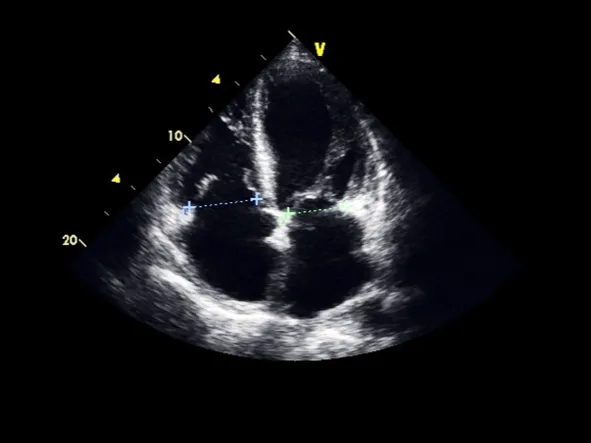
Overview
A transesophageal echocardiogram, sometimes abbreviated as a TEE, is a specialized ultrasound of the heart. It uses sound waves to generate images of the heart, as well as show the flow of blood through different areas of the heart including the heart valves. Unlike a transthoracic echocardiogram, a TEE generates the images by placing a thin probe in the esophagus while the patient is under anesthesia.
Everything You Need To Know
- Why It's Done
-
This test is designed to look at the structure of the heart and obtain a closer view of some structures that cannot be seen by a normal transthoracic echocardiogram. This test is ordered to evaluate valve disease and risk for stroke, among other things, with a concern for a cardiac sources such as a clot in the heart, or an infection of the heart valves.
- Parts of a Transesophageal Echocardiogram (TEE)
-
Two-dimensional (2D) echocardiogram and three-dimensional (3D) echocardiogram: These images provide pictures of the walls of the heart, the valves of the heart and large vessels that connect to the heart.
Doppler echocardiogram: Sound waves change pitch as they move past the red blood cells moving through the heart and its valves. These changes in pitch are used to evaluate the flow of blood through the heart, including the speed and direction. Much like with a transthoracic echocardiogram, this allows the provider to evaluate narrowed or leaking valves.
- Where Is This Test Performed?
-
AdventHealth offers this test at all hospitals. Please arrive 30 minutes before your test is scheduled to allow for check in. The procedure will take approximately 60 minutes, including anesthesia recovery.
- How Is This Test Conducted?
-
Transesophageal echocardiograms are performed by our cardiologists in conjunction with specially trained, registered cardiac sonographers. Additionally, anesthesia will be provided by a trained nurse anesthetist under the supervision of an anesthesiologist using a medication called propofol. The level of anesthesia is similar to what is used in endoscopies and colonoscopies.
Before the start of the test, you will have an IV placed by one of our non-invasive cardiac nurses. You will also receive a throat numbing spray to reduce the risk of spasm during the test. The spray does taste bitter and may make you feel as if your tongue is swollen. Sometimes it can make your nose itch. We will ask you to temporarily remove dentures or partials. Additionally, you will also have small adhesive pads (electrodes) placed on your chest. These electrodes hook up to an electrocardiogram to monitor and record your heart rhythm during the test. Before you are under the effects of the propofol you will have a bite block placed in your mouth to protect your teeth and asked to lie on your left side.
Once you are asleep, the cardiologist will insert the TEE probe in your mouth and place it into position behind the heart. At that point, images of the heart will be obtained. The TEE probe generates soundwaves, which will bounce off the heart and its structures to generate an echo. The soundwaves are identified by the machine, which then generates the 2D, 3D and Doppler images and records them.
- Preparation
-
You will need to be on an empty stomach with nothing to eat or drink after midnight prior to the procedure. Sips of water with medications are fine and no oral medications need to be held prior to the test, including blood thinners.
Because this test is done under anesthesia, you should not drive for the rest of the day, and you will need to have someone drive you home.
When all numbness from the spray is gone, you can eat and drink normally. There may be some residual soreness of the throat, but lozenges should minimize any discomfort.
Your Results
The echocardiogram will be read and interpreted by one of our board-certified cardiologists. They will review the test results after you are fully awake from anesthesia. If this test is done as an outpatient, you should receive a call with the results within a week of having the test done or you may view the results in your AdventHealth Patient Portal.
